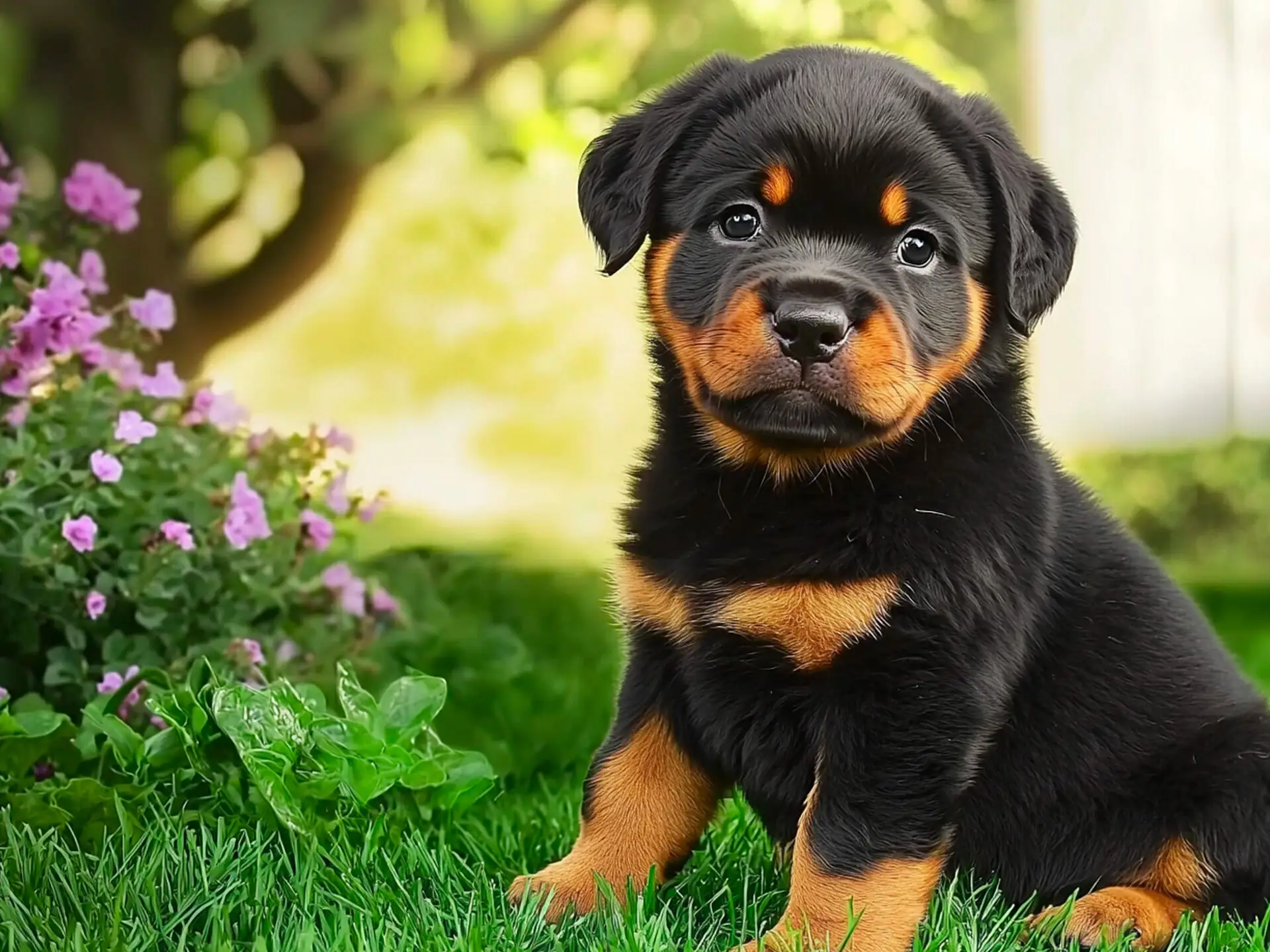Rottweiler Dog Breed Info & Overview
The Rottweiler, a gentle giant with a steadfast guardian spirit, is a breed rooted in ancient Roman history. Renowned for their muscular build, loyalty, and intelligence, Rottweilers are protective yet affectionate companions. Far from just being watchdogs, they thrive as loving family members, always eager to be involved in every aspect of home life, making them both reliable and endearing.
Characteristics
Pictures
Breed History
Did you know that the Rottweiler’s ancestors marched with the Roman legions? These robust dogs herded cattle and protected the troops on their long journeys. As the Romans settled in what is now Germany, the dogs mingled with local breeds, giving rise to the Rottweiler we know today.
In the Middle Ages, Rottweilers were indispensable to butchers in the town of Rottweil, Germany. They earned the nickname “Rottweil Butcher’s Dogs” by driving cattle to market and guarding the proceeds from thieves. Their strength and reliability made them invaluable working companions.
With the advent of rail transport, the need for cattle-driving dogs declined, and the Rottweiler population dwindled. However, their versatility was soon recognized, and they found new roles in police work, search and rescue, and as loyal family protectors. The Rottweiler’s resurgence is a testament to their adaptability and enduring appeal.
Temperament, Personality
Rottweilers are renowned for their unwavering loyalty and protective instincts. They form strong bonds with their families and are often happiest when involved in daily activities. While they may appear aloof with strangers, proper socialization can help them become well-mannered and confident in various situations.
These dogs are intelligent and eager to please, which makes them highly trainable. However, they can also be stubborn at times, requiring a firm yet gentle hand in training. Early obedience classes are recommended to harness their potential and ensure they grow into well-rounded adults.
Despite their tough exterior, Rottweilers have a playful side and enjoy spending time with their loved ones. They can be great with older children who understand how to interact respectfully with a large dog. Their calm demeanor indoors makes them pleasant companions, provided they receive enough exercise.
Physical Characteristics
Rottweilers are robust and muscular, exuding strength and agility. They have a broad head with a moderately long muzzle and almond-shaped, dark brown eyes that convey a confident and alert expression. Their ears are medium-sized and carried forward, enhancing their attentive appearance.
The breed’s coat is short, dense, and straight, providing a weather-resistant layer. The color is always black with clearly defined rust markings on the cheeks, muzzle, chest, legs, and beneath the tail. This distinctive coloration adds to their striking and powerful presence.
Males typically stand between 24 to 27 inches (61–69 cm) at the shoulder, while females range from 22 to 25 inches (56–63 cm). Their weight can vary from 80 to 135 pounds (36–61 kg), with males generally being larger and more robust than females. Their overall appearance is one of strength and endurance.
Health Issues
Like many large breeds, Rottweilers can be prone to certain health issues. Hip and elbow dysplasia are common concerns, where the joints develop abnormally, potentially leading to arthritis or lameness. Regular veterinary check-ups and maintaining a healthy weight can help manage these conditions.
Rottweilers may also be susceptible to heart conditions such as subaortic stenosis (SAS), a narrowing of the heart’s aortic valve. Early detection through routine heart examinations can be crucial. Dilated cardiomyopathy is another heart issue that can affect the breed.
Another health consideration is osteosarcoma, a type of bone cancer more prevalent in larger breeds. Additionally, Rottweilers can be prone to certain eye conditions like progressive retinal atrophy (PRA). Responsible breeding practices and regular health screenings are essential to minimize these risks.
Grooming Needs
Rottweilers have a low-maintenance coat, but that doesn’t mean grooming can be neglected. A weekly brush with a firm bristle brush helps remove loose hairs and keeps their coat shiny. During shedding seasons in spring and fall, more frequent brushing may be necessary to manage increased hair loss.
Bathing should be done as needed, typically every few months, unless they get particularly dirty. Overbathing can strip the coat of natural oils, leading to dry skin. Using a dog-specific shampoo ensures their skin and coat remain healthy.
Don’t forget about dental hygiene and nail care. Regular tooth brushing prevents tartar buildup and promotes fresh breath. Nails should be trimmed regularly to prevent overgrowth and splitting. Checking ears weekly for signs of infection or wax buildup is also important for their overall well-being.
Exercise Requirements
Rottweilers have moderate energy levels but require regular exercise to keep them mentally and physically fit. Daily walks of at least 30 to 60 minutes are essential. They also enjoy playtime in a securely fenced yard where they can run freely.
Engaging activities like obedience training, agility courses, and tracking exercises stimulate their intelligent minds. These tasks not only provide physical exertion but also strengthen the bond between the Rottweiler and their owner.
Without adequate exercise, Rottweilers can become bored, which may lead to destructive behaviors. Consistency is key, so incorporating a variety of activities ensures they remain happy and well-behaved members of the family. Learn more about working dog breeds and their needs.
Training Tips
Early socialization and obedience training are crucial for Rottweilers. Starting from puppyhood, expose them to different people, environments, and other animals to build confidence and reduce potential aggression or fearfulness.
Consistency and positive reinforcement are effective training methods for this breed. Reward-based training with treats and praise encourages good behavior. Avoid harsh corrections, as Rottweilers respond better to firm yet gentle guidance.
Given their intelligence, Rottweilers can excel in advanced training and dog sports. Enrolling them in obedience classes or working with a professional trainer can help address any breed-specific challenges and unlock their full potential.
Nutrition, Diet
Feeding a Rottweiler requires attention to their developmental stage and activity level. Puppies should be fed a high-quality, large-breed puppy formula to support controlled growth and prevent skeletal issues.
Adult Rottweilers typically consume 4 to 6 cups of dry dog food per day, divided into two meals. Opting for a diet rich in protein with balanced fats and carbohydrates supports their muscular build and energy needs.
Monitoring their weight is important to prevent obesity, which can exacerbate joint problems. Consult with a veterinarian to tailor a diet plan that meets the specific nutritional requirements of your Rottweiler based on age, size, and activity level.
Adoption, Breeders
Considering adoption? Many Rottweilers are in need of loving homes. Rescue organizations like the Rottweiler RescueFoundation specialize in rehoming this breed.
If purchasing from a breeder, ensure they are reputable and prioritize health and temperament. Ask for health clearances for hip dysplasia, heart conditions, and other breed-specific issues. Visiting the breeder’s facility can provide insight into how the puppies are raised.
Avoid puppy mills or pet stores that may source from unethical breeders. The American Rottweiler Club provides resources and breeder referrals to help you find a responsible source for your new companion.
Family Pet?
Rottweilers can make excellent family pets for those who understand the breed’s needs. They are affectionate with family members and can be gentle playmates for older children who know how to interact with dogs respectfully.
Supervision is recommended when Rottweilers are around small children due to their size and strength. Teaching both the dog and the children appropriate boundaries ensures harmonious interactions.
Early socialization with other pets is important. Rottweilers can get along with other dogs and even cats if raised together, but their protective instincts may require management in multi-pet households. Discover other breeds suitable for families.
Right For You?
If you’re looking for a loyal, protective companion and are willing to invest time in training and socialization, the Rottweiler might be a great fit. They thrive with confident owners who can provide firm but loving guidance.
Rottweilers are best suited for homes with space to accommodate their size and exercise needs. Apartment living may be challenging unless ample outdoor activities are provided.
Consider your lifestyle and experience with large breeds. Rottweilers require commitment, but their unwavering loyalty and companionship can be incredibly rewarding for the right owner.
Conclusion
Rottweilers are a blend of strength, intelligence, and loyalty. They make devoted companions for those who can meet their needs for training, exercise, and companionship. If you’re ready to welcome a protective and loving guardian into your life, the Rottweiler could be the perfect addition to your family.
FAQs
-
What makes Rottweilers excellent working dogs?
Rottweilers possess strength, intelligence, and adaptability, which makes them ideal for roles like search-and-rescue, therapy, and police work. Their natural protective instincts and ability to follow commands under pressure contribute to their success in working environments.
-
How do Rottweilers express affection toward their owners?
Rottweilers often lean against their owners, follow them around, or sit close to show affection. Their loyalty and calm demeanor create a strong bond, and they thrive on physical closeness and companionship.
-
Can Rottweilers adapt to colder climates?
Yes, Rottweilers have a dense double coat that provides some insulation against cold weather. However, extreme temperatures require additional protection, such as limiting outdoor time and providing warm shelter to prevent discomfort or frostbite.
-
What toys are best suited for a Rottweiler’s chewing habits?
Durable toys like KONGs, heavy-duty rubber balls, and rope toys are ideal for Rottweilers. These help satisfy their strong chewing instincts while providing mental stimulation and preventing destructive behavior.
-
Why is weight management critical for Rottweilers?
Excess weight can exacerbate hip and elbow dysplasia, common in Rottweilers, and increase their risk of heart disease. Regular exercise, portion control, and a balanced diet are essential for maintaining their health and longevity.
Breed Ratings
Rottweilers are highly intelligent and quick learners, making them capable of excelling in obedience and various dog sports.
They enjoy playtime and can be quite playful with their families, especially when engaging in interactive games and activities.
Rottweilers have a moderate energy level, requiring regular exercise but also appreciating downtime with their owners.
They shed moderately throughout the year, with increased shedding during seasonal changes in spring and fall.
With a relatively low prey drive, they can coexist with other pets if properly socialized and trained from an early age.
Their short coat requires minimal grooming, making them relatively low-maintenance in terms of brushing and bathing.
They are eager to please and respond well to positive reinforcement, but consistency is key due to their strong-willed nature.
Rottweilers prefer companionship and may develop separation anxiety if left alone for extended periods.
They are generally quiet dogs, barking only to alert their owners of something unusual or as a warning.
Some drooling can occur, especially after eating or drinking, but it is typically moderate and manageable.
With proper socialization, they can be friendly toward other dogs, but may show dominance if not trained appropriately.
Prone to certain health issues like hip dysplasia and heart conditions, regular vet care is important to maintain their health.



















